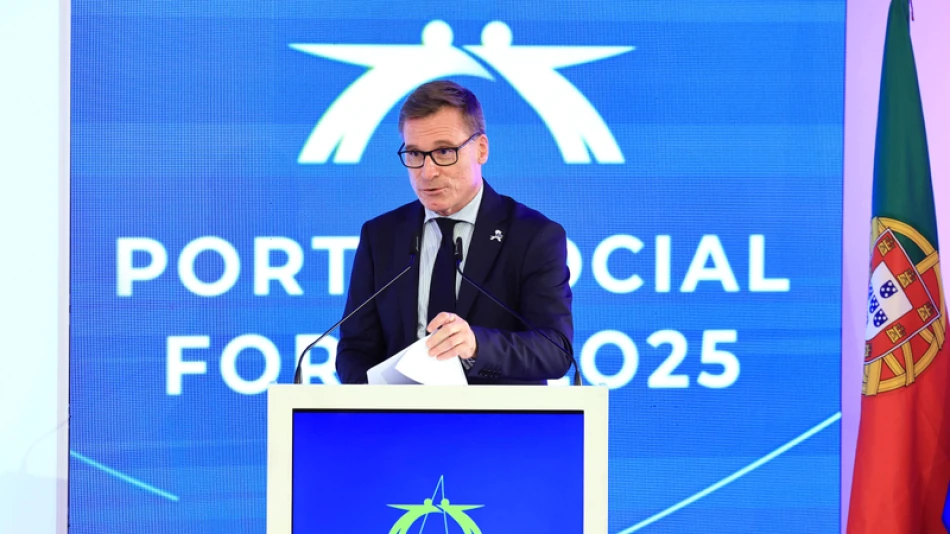
Soaring Cost of Living Crisis Shakes European Confidence in Democracy
Europe's Housing Crisis Threatens Democracy, Warns EU Official
Europe's escalating housing crisis poses a direct threat to democratic institutions and public trust in government, according to outgoing European Economic and Social Committee President Oliver Röpke. With home prices surging 58% since 2010 while wages stagnate, the affordability gap is creating social tensions that could undermine the EU's political stability.
The Democracy Warning
Röpke didn't mince words in his final interview with European Newsroom as his two-and-a-half-year term ends this month. "The cost of living crisis represents a broad threat to confidence in democracy and confidence in Europe's ability to act," he said.
His warning carries weight because it comes from someone who's seen firsthand how housing pressures affect ordinary Europeans. The committee he leads gives workers, businesses, and civil society groups an official voice in EU policymaking.
"We must address this crisis, or we're already seeing an erosion of basic standards, fundamental rights standards, and the rule of law," Röpke added.
The Numbers Tell a Stark Story
European statistics paint a picture of a market spinning out of control. Since 2010, home prices across the EU have jumped 57.9%, according to Eurostat data from July. Rents climbed 27.8% over the same period. But wages haven't kept pace with either increase.
The European Investment Bank has identified a €270 billion ($318 billion) funding gap just to meet current housing needs. That's roughly equivalent to the entire GDP of Finland.
Supply and Demand Imbalance
Construction costs have risen while building activity has slowed, creating fewer new homes. At the same time, more properties are being converted to short-term rentals or bought purely as investments. This double squeeze hits cities particularly hard, where young professionals and families find themselves priced out entirely.
What Europe Can Actually Do
Here's the thing about EU housing policy: the union doesn't directly control home prices, building codes, or housing policies in member countries. Those decisions happen at the national level. But Brussels isn't powerless.
The EU's first-ever Housing Commissioner, Dan Jørgensen, plans to unveil an "Affordable Housing Plan" in early 2026. "This plan will clarify how the EU can make an impact and how we can work together to provide affordable, sustainable housing that's suitable for everyone," he said Tuesday.
Policy Tools on the Table
The Economic and Social Committee has pushed for practical changes. They want EU cohesion policy - the effort to reduce economic gaps between member states - to include affordable housing tools. They also argue EU budget rules should give countries more room to invest in housing.
Röpke acknowledged there's no one-size-fits-all solution, but he hopes the European Commission will propose concrete measures and an action framework for member states.
Why This Matters Beyond Europe
Europe's housing crisis mirrors problems across developed economies. Cities from Vancouver to Sydney to San Francisco face similar affordability challenges. But Europe's situation is particularly telling because it's happening despite the continent's strong social safety nets and worker protections.
The political implications extend beyond housing policy. When basic needs become unaffordable, voters often turn to populist parties promising simple solutions. We've seen this pattern in multiple European elections over the past decade.
The Path Forward
The EU is asking Europeans to participate in public consultations about the housing plan through an online survey. This grassroots input could shape how Brussels approaches the crisis.
But the real test will be whether member states are willing to coordinate on housing policy when they've traditionally guarded this area jealously. The €270 billion funding gap won't fill itself, and national governments will need to decide if housing affordability is worth deeper European integration.
The stakes, according to Röpke, couldn't be higher. When people lose faith in their government's ability to provide basic needs like shelter, they start questioning the entire democratic system. Europe has seen that movie before, and it doesn't end well.
Most Viewed News

 Sara Khaled
Sara Khaled






